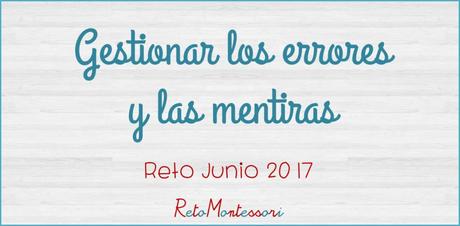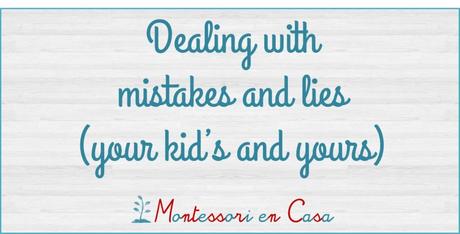(scroll down for English)
Gestionar los errores y las mentiras va a ser nuestro RetoMontessori de Junio, si te animas a unirte para trabajar este tema más a fondo te espero el viernes 26 de Mayo a las 19:00 (hora de Madrid) en el webinar, puedes unirte aquí (tendrás acceso a la grabación por si no puedes asitir en directo).
Por si no sabes en qué consiste RetoMontessori te cuento: Cada mes (normalmente el último martes del mes), publico un post sobre un tema de filosofía Montessori o relacionado con la pedagogía Montessori, que será el tema que trabajaremos durante ese mes en RetoMontessori. Este post está en el blog a disposición de todo el mundo.
Tres días después del post, es decir, el viernes de esa misma semana, expongo el tema con más detalle en un webinar y los asistentes pueden participar planteando preguntas, compartiendo sus ideas, debatiendo, etc, algo que resulta muy interesante y enriquecedor! Para asistir a estos webinars mensuales es necesario unirse a RetoMontessori, aquí te explico cómo hacerlo.
No quiero enrollarme más sobre el funcionamiento de RetoMontessori para no extenderme mucho, pero si tienes cualquier duda ya sabes que puedes dejarme un comentario al final de este post o contactarme por email.
Después de esta intro, vamos al tema:


Más de una vez me habéis pedido que hable sobre cómo gestionar el tema de las mentiras de nuestros hijos, pero también vamos a abordar este tema teniendo en cuenta nuestras propias mentiras, o no pensaréis que podemos esperar que nuestros hijos sean sinceros con nosotros si nosotros no lo somos con ellos, ¿verdad?
Además he querido unir los errores y las mentiras en un mismo tema porque en mi opinión están íntimamente relacionados. ¿Vamos allá?
Los errores
Es fácil ver la conexión que hay entre los errores y las mentiras; gran parte de las mentiras que dicen los niños son una manera de ocultar un error que han cometido y que no quieren asumir. En el caso de los adultos hay una mayor variedad de motivos para mentir, pero uno de ellos sigue siendo ocultar algún error que hemos cometido.
Si cuando nuestro hijo comete un error le juzgamos y le hacemos sentir mal, lo más probable es que la próxima vez que cometa un error intente ocultárnoslo para ahorrarse el mal trago. En cambio, si le animamos a ver sus errores como oportunidades para aprender y mejorar, y no como algo que se deba ocultar, estará mucho más dispuesto a hablar sobre ello de una forma más abierta y positiva.
Por eso la manera en que afrontemos nuestros errores y los de nuestros hijos es muy importante, no sólo para evitar entrar en la dinámica de las mentiras, sino también para favorecer la capacidad de aprender de los errores en vez de culparse y juzgarse por ellos.
Párate a pensar... ¿cómo reaccionas cuando cometes un error? ¿Te fijas más en lo que has hecho mal o en por qué ha ocurrido? Esta diferencia es clave, porque fijarnos en el QUÉ no nos sirve para mucho aparte de sentirnos mal, pero fijarnos en el POR QUÉ nos da el poder de aprender una lección para el futuro.
Lo mismo ocurre con los errores de tus hijos, es importante ayudarles a encontrar el POR QUÉ lo han hecho en lugar de machacarles con lo QUE han hecho.
Por ejemplo, hace una par de semanas me dejé las llaves dentro de casa y tuve que llamar a un cerrajero para poder abrir la puerta. Mi primera reacción fue juzgarme, culparme y criticarme a mí misma: "¿Cómo te has podido dejar las llaves dentro? Es que no estás en lo que tienes que estar... Y ahora tener que pagar un cerrajero por culpa de tu despiste...". Pero cuando respiré un par de veces decidí darle la vuelta, perdonarme a mí misma por mi error y pensar por qué había ocurrido y qué podía aprender de ello. Los niños no estaban conmigo cuando ocurrió, pero mas tarde se lo conté y les expliqué cómo me había sentido y cómo había decidido aprender de mi error en vez de quedarme atrapada en la culpa.
Si cuando cometemos un error lo comentamos abiertamente y explicamos algo positivo que hayamos sacado de la experiencia, nuestros hijos aprenderán a hacer lo mismo. En casa tenemos la costumbre de hacerlo al menos una vez a la semana, cuando estamos todos juntos, por ejemplo en una reunión familiar, cada uno puede explicar un error que haya cometido durante la semana y qué ha aprendido.
Las mentiras
Una estupenda manera de favorecer en casa la confianza y la sinceridad es p redicar con el ejemplo. La confianza es una relación de doble sentido, así que para que nuestros hijos sean sinceros con nosotros es imprescindible que nosotros lo seamos con ellos. Esto es de cajón, pero no quería dejar de mencionarlo porque por desgracia es muy común encontrar adultos que mienten a los niños y luego esperan que los niños no les mientan a ellos...
Por otra parte, es muy positivo valorar la sinceridad, por ejemplo cuando nuestros hijos nos "confiesan" algo que han hecho y no nos parece bien, en vez de soltarles una charla sobre por qué no deberían haberlo hecho, lo primero que debemos hacer es valorar y agradecer que hayan tenido el valor de contárnoslo, después ya pasaremos a preguntarles por qué lo han hecho, cuál era su objetivo, cómo se sintieron al hacerlo, cómo lo harían si volvieran a encontrarse en una situación similar... Ayudarles a encontrar el por qué y a extraer una lección de su error.
A veces nos cuesta tener estas cosas en cuenta en el día a día, a mí como habéis visto en el ejemplo no es algo que me salga de manera natural, pero si me tomo un momento sé que puedo cambiar el chip, ¡y si yo puedo hacerlo estoy segura de que tú también puedes! ¿Te animas a intentarlo?
En el webinar del viernes 26 de Mayo hablaremos de esto con más detalle y como siempre, tendremos una ronda de preguntas para resolver dudas. Si quieres asistir y tener acceso a la grabación, puedes unirte ahora a RetoMontessori, te espero! 😉






More than once I have been asked to talk about how to handle our children's lies, but today I will also address this issue by considering our own lies, as we can't expect our children to be sincere with us if we are not sincere with them, right?
I also wanted to combine mistakes and lies in the same post because in my opinion they are closely related.
Mistakes
It is easy to see the connection between mistakes and lies; many of the lies children say are a way to hide a mistake they have made and do not want to take on. In the case of adults there is a greater variety of reasons to lie, but one of them is still to hide some mistake that we have committed.
If when our child makes a mistake we judge her and we make her feel bad, chances are that the next time she makes a mistake will try to hide it to avoid the scolding. Instead, if we encourage her to see her mistakes as opportunities to learn and improve, and not as something to hide, she will be much more willing to talk about it in a more open and positive way.
That is why the way we deal with our mistakes and those of our children is very important, not only to avoid entering the dynamics of lies, but also to favor the ability to learn from mistakes instead of blaming and judging ourselves.
Think for a moment... How do you react when you make a mistake? Do you pay more attention to WHAT you have done wrong or WHY it has happened? This difference is key, because looking at WHAT does not serve us much besides feeling bad, but look at WHY it gives us the power to learn a lesson for the future.
The same is true of your child's mistakes, it is important to help them find the WHY instead of scolding them about the WHAT.
For example, a couple of weeks ago I left the keys inside the house and I had to call a locksmith to be able to open the door. My first reaction was to judge, blame and criticize myself: "How could you leave the keys inside? What were you thinking about? And now you need to pay a locksmith because of your mistake...". But when I breathed a couple of times I decided to turn it around, forgive myself for my mistake and think why it had happened and what I could learn from it. The children were not with me when it happened, but later I told them and explained how I had felt and how I had decided to learn from my mistake instead of being caught in guilt.
If when we make a mistake we talk openly and explain something positive that we have taken from the experience, our children will learn to do the same. At home we have the habit of doing it at least once a week, when we are all together, for example in a family meeting, each one can explain a mistake that has committed during the week and what has learned form it.
Lies
A great way to favor trust and sincerity at home is to be a good model. Trust is a two-way relationship, so for our children to be sincere with us it is imperative that we are sincere with them. This is a no-brainer, but I want to mention it because unfortunately it is very common to find adults who lie to children and then hope that children will not lie to them...
On the other hand, it is very positive to value sincerity, for example when our children "confess" something they have done, instead of scolding them about why they should not have done it, the first thing to do is appreciate and value that they had the courage to tell us, then we will ask them why they did it, what their goal was, how they felt when they did it, how they would do it if they were to find themselves in a similar situation... Help them find the WHY and get a lesson from their mistake.
Sometimes it's hard for us to take these things into account on a daily basis, as you have seen in the example this is not something that comes naturally for me, but if I take a moment I know I can change the way I respond, and if I can do it, I'm sure you can too! Do you want to give it a try?
Did you like this post? Share it! 🙂



